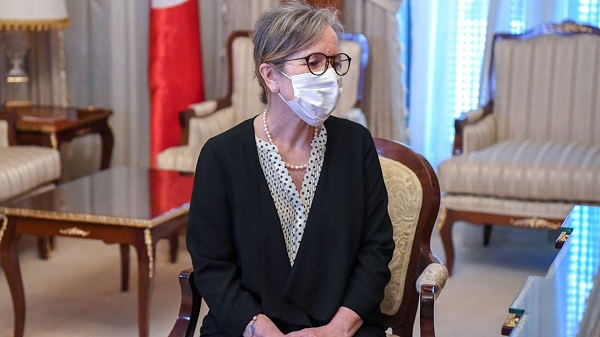Tunisia’s crisis-stricken economy will be a top priority for the new government of prime minister-designate Najla Bouden, after a decade of political instability that has stymied foreign investment.
Heavily in debt, with spiralling inflation and widespread unemployment worsened by the coronavirus pandemic, Tunisia is hoping for a bailout package from the International Monetary Fund.
But talks have been suspended since President Kais Saied on July 25 sacked the government, suspended parliament and seized a range of executive powers, later moving to rule by decree.
On Wednesday, he charged Bouden, a political unknown with a background in geology, with forming a new administration.
“The incoming government must quickly relaunch negotiations with the IMF in order to obtain funding,” said economist and former trade minister Mohsen Hassan.
“Unfortunately Tunisia is paying the price of political instability and the coronavirus crisis, as well as the political class’s ignorance of economics.”
The Tunisian economy has grown by as little as 0.6 percent on average over the past decade, with inflation averaging six percent.
Around a fifth of the country’s 12 million population are in poverty or vulnerable, according to World Bank figures, a toll worsened by the Covid-19 pandemic.
Investors losing confidence
Coronavirus particularly slammed the crucial tourism sector, which in normal years accounts for 14 percent of gross domestic product and hundreds of thousands of jobs.
Overall the pandemic caused the economy to shrink by 8.8 percent in 2020.
To find a way out of the abyss, the government of prime minister Hichem Mechichi turned earlier this year to the IMF for Tunisia’s fourth bailout in a decade, asking the global lender for a three-year loan of $4 billion.
The talks, expected to involve IMF demands for painful structural reforms, have been on hold since Saied’s July 25 power grab.
In a Facebook post on Thursday, Bouden promised to “work for the formation of a homogenous government to tackle the country’s economic difficulties and fight against corruption.”
But with debt standing at over 80 percent of GDP, Tunisia has dipped into international funds to service its debts, as well as to pay the salaries of its vast civil service — some 14 percent of the total workforce.
Bouden will be Tunisia’s tenth prime minister since the 2011 revolution that overthrew longtime dictator Zine El Abidine Ben Ali and threw the country into a decade of political instability.
Hassan urged the government to declare a “state of economic emergency”.
The economist pointed out that since Saied’s dramatic July moves, the president has not announced any economic measures apart from vowing to battle theft and corruption among the country’s political elite and state institutions.
“Economic actors are losing trust, and we have lost a large number foreign partners,” he warned.
Lack of roadmap
For Mehdi Bhouri, a former central bank macroeconomist who has launched a business growing algae for pharmaceutical applications, the lack of a roadmap is an obstacle to investment. “I understand that we are in an exceptional situation, but there needs to be clarity,” he said.
Bhouri said he had applied for funding from overseas investors to move to industrial-scale production, but that receiving it depended on stability.
Tunisia’s reputation as a destination for investment has taken repeated hits in recent years. The day after Saied’s July 25 announcement, ratings agency Fitch warned that the country’s political troubles risked further delaying the IMF talks.
Tunisia needs to find 4.5 billion euros ($5.3 billion) in debt repayments this year alone.
Tarak Cherif, head of the Tunisian Confederation of Citizen Enterprises, welcomed Saied’s moves on July 25.
But he called for “the rapid formation of a government and measures to encourage economic actors in the country to create wealth and investment.”
“Every day that passes counts against us,” he added.



